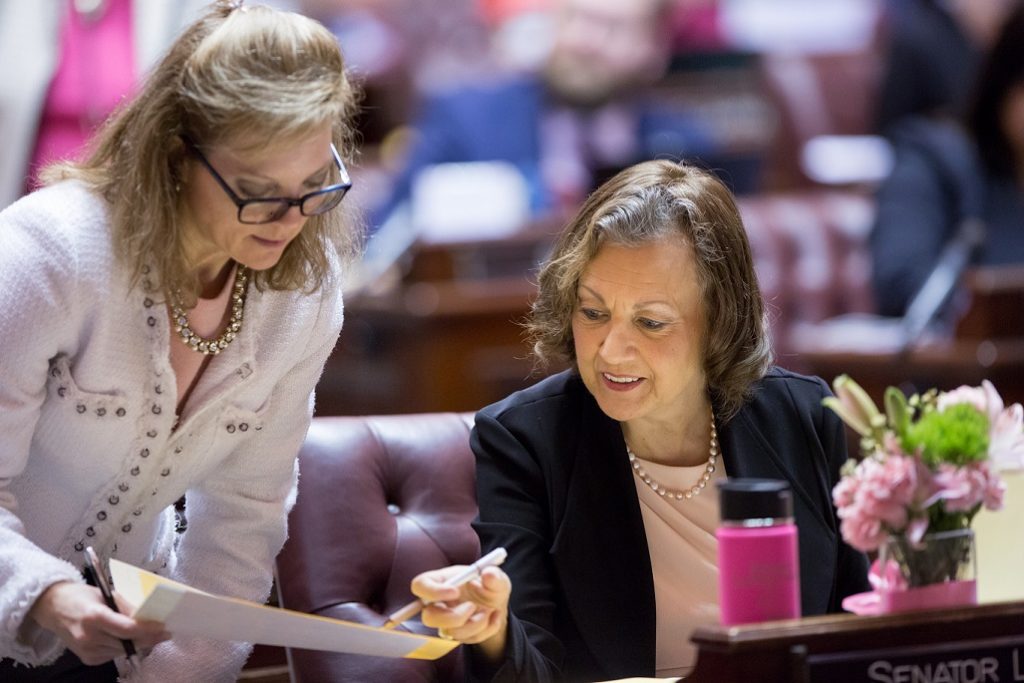Hello, Friends and Neighbors!
We have just concluded the 11th week of the 2019 legislative session. The Senate’s policy committees have a few more days to consider legislation sent to us by the House of Representatives, and I’m happy to see that some of my bills are making headway in the House committees. But the real news from the Capitol is that we have also moved into the budget phase of the session – and unfortunately, it’s not good news for taxpayers.
The majority side in the House released its proposed 2019-21 state operating budget Monday. The Senate’s Democrat majority unveiled its version today. Both contain so much additional spending that they are balanced with billions of dollars in new or higher taxes.

In the Senate, both the budget bill and the tax legislation tied to it must come before our Ways and Means Committee. This is exactly why I wanted to serve on Ways and Means this year – it gives me an opportunity to alert you sooner about proposed tax and spending changes, and also, only members of the committee can propose changes (in the form of amendments) to the budget and any underlying tax proposals. In that sense, being on the budget committee gives me an additional opportunity to represent the concerns of taxpayers – both households and employers – when someone wants to reach deeper into their pockets.
Senate, House budget proposals both outspend available revenue
State government’s operating budget covers two years, not one – a custom that dates from when legislative sessions took place only in odd-numbered years. Also, the building of a new state budget doesn’t start from scratch but from where the current budget leaves off. That allows programs and services to be maintained at their current level.
When we started the 2019 session there was more than enough revenue on hand to maintain services and programs at their current level for the next two years, and also factor in the increased spending needed to uphold policy commitments. That increased spending includes an additional $3.8 billion for K-12 education – something to remember as the budget discussion proceeds in Olympia. Even then, the state would have more than $500 million left in the bank, without touching the voter-created “rainy-day fund.” On March 20, we received the first quarterly revenue forecast of the year, which made another $750 million available for budgeting.
It’s no wonder that the Republican leader on our budget committee told The Columbian recently that the budget situation is the best Washington legislators have seen in the 21st century.
But that is not enough for the budget writers in the House and Senate. The House majority proposes to spend $53.3 billion in 2019-21. That represents a 19% jump in spending from the current budget of $46.6 billion. An increase that big hasn’t been seen in 30 years! And it’s well ahead of the $50.6 billion in available revenue, which is why the House budget also requires a lot of new taxes.
The Senate budget came in lower than the House, calling for $52.2 billion in spending over the next two years. But that still is an increase of nearly 17% over the current budget, and still outspends the available revenue. The Senate majority also wants some new taxes, although it’s not nearly as much as the House.
Big-spending budgets mean
the ‘taxapalooza’ gets even bigger
State government is on a two-year budget cycle, but a unique Washington law requires every two-year budget to also balance across four years (meaning 2019-21, and also 2021-23). This forces the budget writers to consider the longer-term effect of tax and spending choices. With that in mind, here are the $4.2 billion in new state taxes the House majority wants over the next four years to balance a 19% increase in government spending:
• a new state income tax (on capital gains income, to start with) – $2.7 billion
• higher B&O taxes on services – $1.05 billion
• higher taxes on real-estate transactions – $320 million
• repeal of three tax preferences, including the preference that exempts Oregon shoppers from Washington sales tax ($140 million)
Plus two tax increases that aren’t needed to balance their budget:
• raise the local school-levy part of your property tax – $1.3 billion possible increase per year, statewide
• a payroll tax that would offer a one-time long-term care benefit
The Senate majority is not pursuing a state income tax, or higher B&O tax on services, or supporting a “lift” of the school-levy lid, but it too supports a higher tax on real-estate transactions and an end to the out-of-state sales-tax exemption.
The other big new tax in the Senate budget would be a higher tax on insurance premiums, to generate $215 million over four years for wildfire prevention and suppression. This wouldn’t just hit people paying premiums on homes and autos; it would also pose a cost to insurance companies based in our state.
When other legislators claim any of these new taxes are needed to pay for basic education, just remember the point I made earlier: the commitment to increased funding for K-12 was already rolled into the “maintenance-level” budget. That’s $3.8 billion in additional funding, without any tax changes. So none of these new or higher taxes are truly for our K-12 schools. Not even for special education. And if they aren’t for schools, who do they benefit? Not the taxpayers.
Three of my bills continue
to advance in House
Knowing that the Legislature has a budget surplus available that can be used for smart investments, maybe this will be the year that my Mental Health for Heroes Act becomes law.
In each of the past two years my legislation sailed through the Senate only to stall in the House budget committee. I can’t believe it was because of the cost – about $550,000 each year, to make sure all public four-year institutions in Washington employ at least one full-time mental-health counselor who has experience and training specifically related to working with active members or the military or military veterans. Either way, there is no budget excuse for opposing the bill this year.
This week the House committee on college and workforce development endorsed SB 5428. Its next stop: the House budget committee, and I hope the outcome is positive this time.
SB 5151, my bill to require a “rational system” for the filing and indexing of decisions and orders from the state’s Growth Management Hearings Board, is already awaiting action from the House budget committee.
The bill that is farthest through the lawmaking process is SB 5148, my proposal to let hunters choose blaze pink safety clothing along with the long-required fluorescent orange. It has reached the House Rules Committee, which places bills on the House voting calendar.
Seeing that the House majority’s budget supports a tax exemption for feminine-hygiene products, I still have not given up on seeing my version (SB 5147) move forward. At the moment the Senate budget committee is holding onto it, along with SB 5149, my bill to allow use of electronic-monitoring technology to forewarn victims of domestic violence and similar crimes when the perpetrators are nearby.
With less than a month to go in our session, and a battle over taxes and spending on the horizon, it’s about to get even busier at the Capitol. But as always, I appreciate the e-mails and phone calls that have come in from the people of our district about that and issues before us.
Yours in service,











